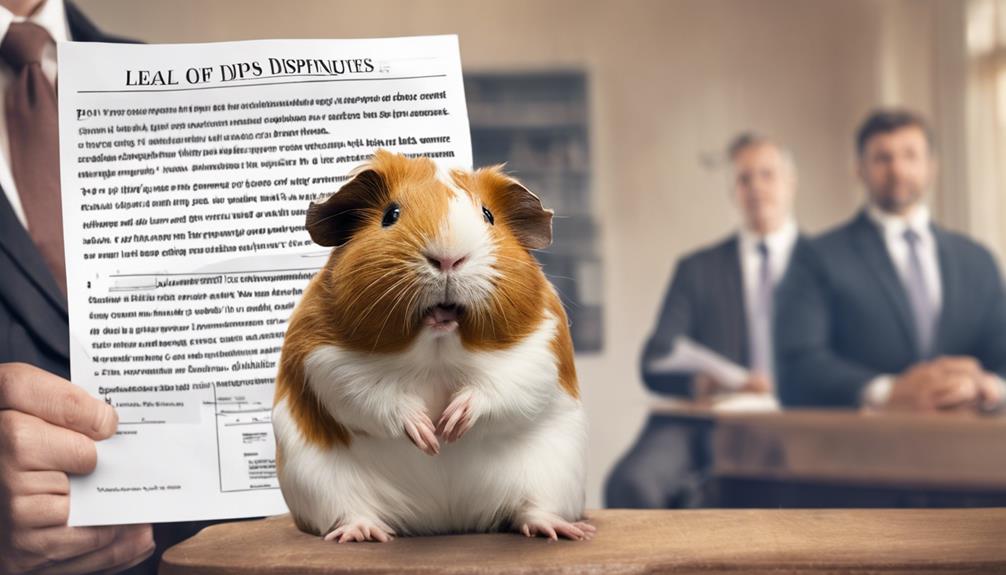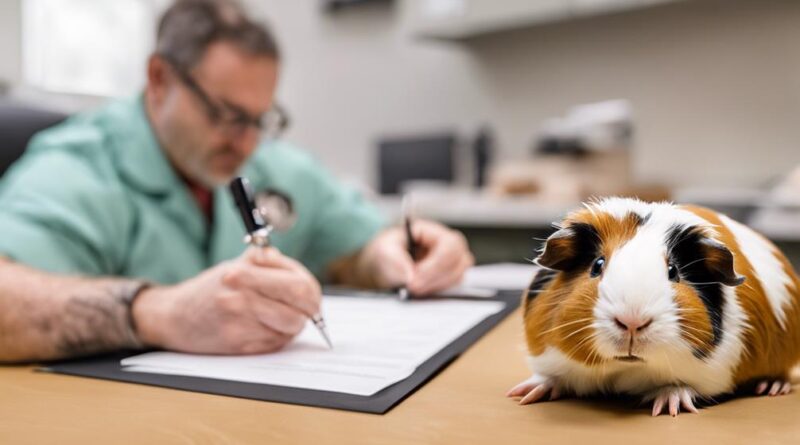Top 3 Legal Rights for Guinea Pig Owners
Ensuring the well-being of your furry companions involves understanding their legal rights. Did you know that guinea pig owners have specific protections under the law?
From ensuring proper care to safeguarding against mistreatment, these legal rights play a crucial role in your role as a responsible pet owner.
Discover the top three legal rights that every guinea pig owner should be aware of to advocate for the welfare of their beloved pets.
Importance of Guinea Pig Welfare
As a responsible guinea pig owner, ensuring the welfare of your furry companion is crucial for their health and happiness. Guinea pig nutrition plays a vital role in maintaining their well-being. These small animals have specific dietary requirements that need to be met to keep them healthy. A balanced diet for your guinea pig should consist of high-quality hay, fresh vegetables, pellets formulated for guinea pigs, and a constant supply of fresh water. Proper nutrition is essential for their growth, digestion, and overall health.
In addition to nutrition, meeting your guinea pig's socialization needs is equally important. These sociable creatures thrive on companionship and interaction. Guinea pigs are happiest when they have a companion of their own kind, as they are herd animals by nature. If you have a single guinea pig, consider getting them a friend to prevent loneliness and ensure their social well-being. Spending time with your guinea pig, talking to them, and providing opportunities for play and exercise can greatly contribute to their mental stimulation and happiness.
Housing and Environment Requirements
Ensuring proper housing and environmental conditions is essential for the well-being of your guinea pig. When it comes to cage size, make sure it's spacious enough for your guinea pig to move around comfortably. A general rule of thumb is a minimum of 7.5 square feet of space for one guinea pig, with additional room for each extra guinea pig. Bedding is crucial for absorbing moisture and providing a soft surface for your pet. Opt for materials like paper-based bedding or hay to keep your guinea pig cozy and dry.
Temperature regulation is vital. Guinea pigs are sensitive to heat, so it's crucial to keep their environment between 65-75°F. During hot weather, provide cooling options like ceramic tiles or frozen water bottles wrapped in a towel. Conversely, in colder months, offer warm hideouts or snuggle safes to help them stay warm. Additionally, create hiding spots in the cage to allow your guinea pig a sense of security. These can be as simple as cardboard boxes or specially designed hideouts. Providing these safe spaces helps reduce stress and promotes your guinea pig's mental well-being.
Veterinary Care and Medical Rights
Proper veterinary care is crucial for ensuring the health and well-being of your guinea pig. To provide the best medical attention for your furry friend, consider the following essential points:
- Preventative Care: Regular wellness exams are vital to catch any health issues early on. These check-ups help monitor your guinea pig's overall health and can prevent potential problems from escalating.
- Emergency Care: In case of any sudden health emergencies, having access to a reliable emergency vet is crucial. Be prepared with a list of emergency veterinary clinics that specialize in treating guinea pigs.
- Insurance Coverage: Consider investing in pet insurance that covers veterinary expenses. This can alleviate financial burdens when unexpected medical issues arise, ensuring your guinea pig receives the necessary care without hesitation.
- Specialized Veterinary Services: Guinea pigs are unique creatures with specific medical needs. Ensure you have a veterinarian experienced in treating guinea pigs to provide the best care possible.
Protection Against Cruelty and Neglect
To safeguard your guinea pig's well-being, understanding and advocating for legal protections against cruelty and neglect is essential. Guinea pigs, like all animals, deserve to be treated with care and respect. Preventing abuse and neglect is crucial in ensuring the welfare of these small pets. Laws and regulations have been put in place to protect animals from mistreatment, and it's important for you as a guinea pig owner to be aware of these guidelines.
Regulations against cruelty and neglect are enforced to hold individuals accountable for their actions. These laws aim to prevent any form of harm, whether intentional or due to negligence, towards guinea pigs. If you suspect that your guinea pig is being mistreated or neglected, it's vital to report it to the appropriate authorities for investigation. By taking action, you not only protect your own pet but also contribute to the welfare of all guinea pigs.
Enforcement of these regulations ensures that those who violate the laws regarding animal welfare face consequences for their actions. By advocating for the well-being of guinea pigs and supporting the enforcement of anti-cruelty laws, you play a vital role in creating a safer environment for these beloved pets. Stay informed, stay vigilant, and stand up against any form of abuse or neglect towards guinea pigs.
Rights Regarding Breeding and Sales
Understanding the regulations surrounding breeding and sales of guinea pigs is crucial for ensuring their well-being in the pet trade industry. When it comes to breeding regulations and sales restrictions for guinea pigs, here are some important points to consider:
- Breeding Regulations:
- Breeding licenses may be required depending on your location.
- There may be restrictions on the number of litters a guinea pig can have in a year.
- Breeding closely related guinea pigs may be prohibited to maintain genetic diversity.
- Some jurisdictions have specific guidelines on the age and health of guinea pigs used for breeding.
- Sales Restrictions:
- Selling guinea pigs below a certain age may be illegal to ensure they're mature enough to be separated from their mothers.
- Some regions have restrictions on where and how guinea pigs can be sold to prevent impulse buying.
- Health checks and certifications may be necessary before selling guinea pigs to ensure they're free from diseases.
- There could be regulations on the advertising and marketing of guinea pigs to prevent misleading practices.
Legal Ownership and Property Rights
Legal ownership and property rights for guinea pig owners are essential aspects to consider in ensuring proper care and protection for these beloved pets. As a guinea pig owner, you have legal responsibilities that come with owning a pet. It's crucial to understand that your guinea pig is considered your property, and you're responsible for providing it with a safe and healthy environment.
Ownership documentation is vital in establishing your legal rights over your guinea pig. This documentation can include adoption papers, purchase receipts, or any other proof of ownership. In case of any disputes or issues regarding ownership, having these documents can help protect your rights and ensure that your guinea pig remains in your care.
When it comes to legal responsibilities, it's important to abide by local laws and regulations concerning pet ownership. This includes providing adequate food, water, shelter, and medical care for your guinea pig. Neglecting these responsibilities can result in legal consequences and potentially lead to losing ownership of your pet.
Rights in Cases of Disputes or Issues

In case disputes arise regarding ownership or care for your guinea pig, knowing your rights is crucial to protecting your pet and ensuring a fair resolution. Legal representation can be pivotal in navigating complex legal processes and ensuring your rights are upheld. Here are some key points to consider:
- Legal Representation: In disputes involving your guinea pig, having legal representation can provide you with expert advice and guidance on how to proceed effectively.
- Ownership Disputes: If someone claims ownership of your guinea pig, you have the right to defend your ownership and provide evidence to support your claim.
- Rights Protection: Your guinea pig is considered your property, and you have the right to protect their well-being and ensure they aren't taken away from you unjustly.
- Fair Resolution: Seek mediation or legal action if necessary to reach a fair resolution in cases where disputes can't be resolved amicably.
Understanding your rights in ownership disputes is essential for safeguarding your relationship with your beloved guinea pig. By being informed and prepared, you can address conflicts effectively and ensure the best outcome for both you and your pet.
Advocacy and Resources for Owners
For guinea pig owners seeking support and guidance, advocacy groups and online resources can be valuable assets in navigating care and legal matters effectively. Advocacy groups dedicated to guinea pig welfare can provide you with crucial information on bonding techniques that can help strengthen the relationship between you and your pet. These groups often offer tips on how to create a bond of trust with your guinea pig through gentle handling, spending quality time together, and understanding their behaviors.
When it comes to meeting your guinea pig's nutritional needs, online resources can be a treasure trove of information. Websites and forums run by experienced guinea pig owners and veterinarians can offer guidance on the best diet for your furry friend. You can learn about the importance of providing fresh hay, vegetables, and pellets in the right proportions to ensure your guinea pig stays healthy and happy.
Frequently Asked Questions
Can Guinea Pig Owners Legally Sue Pet Stores or Breeders for Selling Sick Animals?
If a pet store or breeder sells you a sick guinea pig, you may have legal recourse. They've a legal responsibility to provide healthy animals. If they're negligent and sell you a sick pet, you could potentially sue them.
Consumer protection laws may also come into play, especially if there was a warranty on the health of the guinea pig. It's essential to know your rights and seek legal advice if needed.
Are There Any Specific Regulations Regarding the Transportation of Guinea Pigs?
When traveling with your guinea pig, it's crucial to follow transportation regulations for their safety. Make sure to use appropriate travel carriers that meet guidelines for size and ventilation.
Always secure the carrier properly in your vehicle to prevent any accidents or injuries.
What Legal Actions Can Be Taken if a Neighbor's Pet Poses a Threat to a Guinea Pig?
If a neighbor's pet poses a threat to your guinea pig, you have legal rights to protect your pet's safety. In cases of animal attacks, you can take legal action against the owner.
Neighbor disputes involving pet safety can be resolved through legal recourse. It's important to know your rights and take necessary steps to ensure your guinea pig is protected from any harm caused by a neighbor's pet.
Are There Any Laws in Place to Protect Guinea Pigs From Being Used in Scientific Experiments?
When it comes to animal welfare, laws exist to protect guinea pigs from being used in scientific research without proper regulations. These laws aim to ensure that research involving animals is conducted ethically and with their well-being in mind.
If you suspect any violations of these laws, you can report them to the appropriate authorities to uphold the rights of guinea pigs and other animals involved in scientific experiments.
Can Guinea Pig Owners Legally Seek Compensation for Emotional Distress Caused by the Mistreatment of Their Pet?
If your guinea pig suffers mistreatment causing emotional distress, you may have legal recourse to seek compensation. Laws vary, but some jurisdictions recognize pets as more than just property.
To pursue compensation for emotional distress due to pet mistreatment, consult with a lawyer specializing in animal rights. Be sure to document the mistreatment and its effects on your pet and yourself to strengthen your case for seeking compensation.
Conclusion
In conclusion, as a guinea pig owner, you have important legal rights to ensure the welfare and well-being of your beloved pets. From providing proper housing and veterinary care to protecting them from cruelty and neglect, it's crucial to be aware of and advocate for these rights.
By understanding your legal responsibilities and rights, you can ensure a safe and happy life for your guinea pigs. Stay informed and stand up for your furry friends!
